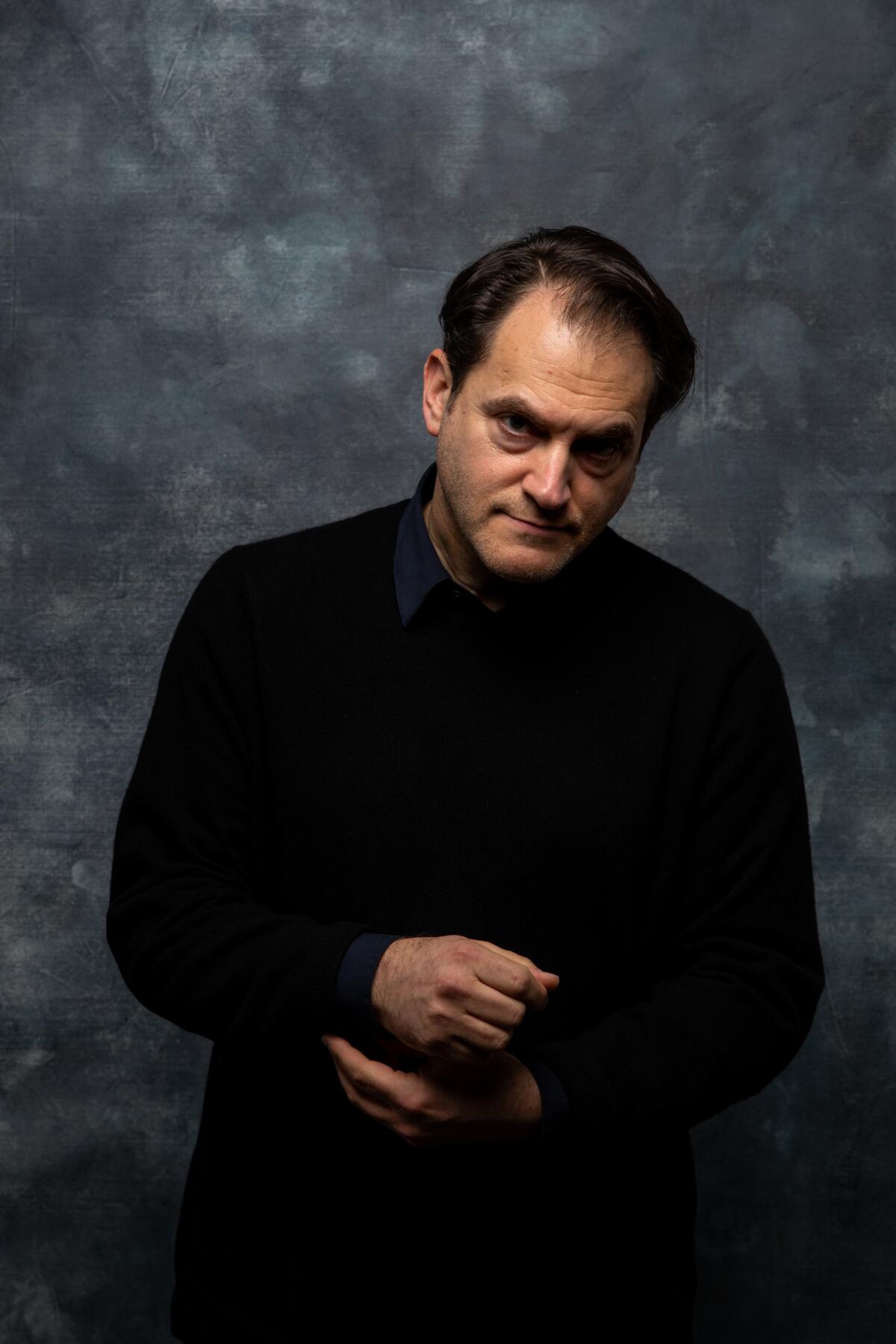The actor behind the guy you hated on ‘Dopesick’

- Share via
Michael Stuhlbarg turns real people into the stuff of rich portrayals, often behind-the-scenes players we may not have preconceived ideas of — gangster Arnold Rothstein (“Boardwalk Empire”), software innovator Andy Hertzfeld (“Steve Jobs”), counterterrorism expert Richard Clarke (“The Looming Tower”) — until Stuhlbarg dimensionalizes them. We can now add Purdue Pharma president and family scion Richard Sackler to Stuhlbarg’s roster of consequential figures brought into the light, thanks to the Hulu limited series “Dopesick.”
The Juilliard-trained actor’s portrayal is Emmy-nominated in the supporting category, but there’s no question from his coiled, commanding performance who the major player was in making addictive opiate OxyContin both a billion-dollar drug and a deadly nationwide scourge. Recently, over Zoom from New Orleans, where he’s filming Season 2 of Showtime’s “Your Honor,” Stuhlbarg reflected on finding the private keys to a now-public villain.
Do you have a foolproof way of getting into a real person?
It’s like a big lump of marble, and you just start chipping away. With each thing you learn, hopefully it’ll inform how you go about it. It’s learning while you’re doing it. There was a deposition video with very telling moments. Then, if you’re lucky, you have someone like [showrunner] Danny Strong at the helm, who knows his subject cold and has the wherewithal to track the things down he doesn’t know. It grew and changed over the months we were making it. That was thrilling.
Richard’s uncle was pharmaceutical marketing pioneer Arthur Sackler. What about the family dynamic helped you with your portrayal?
That Arthur and his brothers Mortimer and Raymond were poor grocers in Brooklyn. Their father was a lovable guy with a big heart who would help out anybody and, as a result, lost his business. Arthur had to step up, made huge amounts of money and brought his brothers along in the pharmaceutical business. The shadow he cast was this undeniable thing for Richard growing up, trying to make his own way in the world. I think it was essential for him that he make his mark.
Richard Sackler expresses a need to rid the world of pain. From your viewpoint, what was his own particular pain?
He felt like a lone wolf. And that he had something big to prove. He went as far as he could to prove it over and over again to [a family] who thought nothing of him. There is something in our story reminiscent of Richard III, of “I’m going to do what I do.” He has his ambitions, and he’s more successful than he ever realized. But I don’t know if it makes him any happier.
Did Richard Sackler equate his self-worth with acceptance of his “miracle” drug?
Yes. He felt that if used as prescribed by a doctor, it would cure someone’s pain. The problem is the blind spot, that it was addictive and they lied about it, and he just stuck to his guns in terms of blaming any addiction on people who abused it. He didn’t take responsibility for it.
One hallmark of your performance is how little pleasure Sackler shows in being successful. There’s a shot of you looking at a vacation website, and your expression is, “Why am I doing this?”
He got so sucked into seeing this idea through that it put his entire other life on hold indefinitely. “I can’t go on vacation. I can never go on vacation. I don’t have time for that. I have to run this, because nobody else is capable of it.”
He won’t even bother removing a despised piece of art from his uncle Arthur’s collection that’s on the bedroom wall and put up something he does like.
Right, because it feeds him. That’s the individual Danny wrote, the fellow who keeps a multimillion-dollar thing on his wall because it pisses him off. He hates it every day, and it allows him to wake up in the morning and remember why he’s there, what he’s trying to do, who he wants to be. Which was be bigger than Arthur.
Did you ever hear from any Sackler family members about your playing him?
One of their lawyers reached out to us to discuss their point of view about the project. But I was told that it was best our legal department meet with them. So I never had any personal interaction with any of them. It would have been fascinating, I’m sure. And I’ve not heard anything [since], and I don’t expect to. And that’s OK. Other times when I’ve played real people, I got to meet them, and most of the time it’s really wonderful. But it can also become complicated.
“Dopesick” made a deep impression with viewers. If one didn’t already know about the Sackler family from news reports, or Beth Macy’s source book, or Patrick Radden Keefe’s exposé “Empire of Pain,” this show was an eye-opener. Have you felt that impact?
When something strikes a chord with people, you’re pleased to have been part of it. And those are rare in my experience. What I keep learning is what a profound effect that drug had on so many lives, how it ruined people, their families, friends’ lives. What addiction is. I hope in one sense that it doesn’t make anyone going through that circumstance feel alone anymore. It’s a beast. And I’m just grateful to have been a part of this.
More to Read
From the Oscars to the Emmys.
Get the Envelope newsletter for exclusive awards season coverage, behind-the-scenes stories from the Envelope podcast and columnist Glenn Whipp’s must-read analysis.
You may occasionally receive promotional content from the Los Angeles Times.










